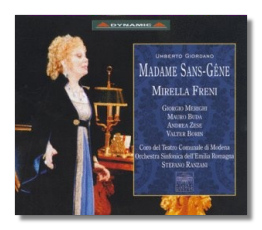
The Internet's Premier Classical Music Source
Related Links
- Latest Reviews
- More Reviews
-
By Composer
-
Collections
DVD & Blu-ray
Books
Concert Reviews
Articles/Interviews
Software
Audio
Search Amazon
Recommended Links
Site News
 CD Review
CD Review
Umberto Giordano

Madame Sans-Gêne
- Caterina - Mirella Freni, soprano
- Lefebvre - Giorgio Merighi, tenor
- Fouché - Andrea Zese, baritone
- Count Neipperg - Valter Borin, tenor
- Napoleon - Mauro Buda, baritone
Emilia Romagna "Arturo Toscanini" Symphony Orchestra/Stefano Ranzani
Modena Teatro Communale Chorus/Stefano Colò
Dynamic CDS247 2CDs Recorded January & February 1999
Umberto Giordano (1867-1948) wrote 13 operas, several of them quite successful in their time, but only Andrea Chénier and (more marginally) Fedora have remained in the repertory – and then only when singers of stature took up their cause. A younger contemporary of Puccini, his use of verismo subjects and effects is less subtle, often stressing theatricality more than musical expressiveness. But at his best, he provides music that is effective on stage and entertaining to hear.
Madame Sans-Gêne (literally "Madame Carefree") was given its première at the Met in 1915 under Toscanini. Based on a play by Sardou and Moreau, with a libretto by Renato Simoni, it is a realistic comedy that (like Chenier) takes place during and (in this case after) the French Revolution .It deals with the adventures of a resourceful laundress (Caterina) who becomes a duchess, is scorned by the ladies of the court and dismissed by Napoleon, but is restored to her husband (Lefebvre) when she reveals to the Emperor the faithfulness of his wife. It is a vivacious and tuneful comedy drama with some dark undertones (especially in Caterina's confrontation with Napoleon in Act III), but there is little action, a lot of dramatic declamation, and few memorable lyrical passages for the singers. It must have been entertaining in the theater, but it is less so – though still enjoyable – listening to it in an armchair.
This recording is from a 1999 production in Modena, Mirella Freni's hometown. Unhappily, her voice was pretty much gone by the time she got to it, and though she makes the most of what she has left and her characterization is as deft as ever, it's often hard to listen to her moving uncertainly from phrase to phrase. The rest of the cast is solidly professional, however, singing clearly and idiomatically, with Merighi a robust and romantic Lefebvre and Buda a resonant and forceful Napoleon. The orchestra and chorus are also very good, and Ranzani keeps everything moving along briskly. A bit out of the way, obviously, but for lovers of Italian verismo, a rewarding experience.
Copyright © 1999, Alexander J. Morin


















